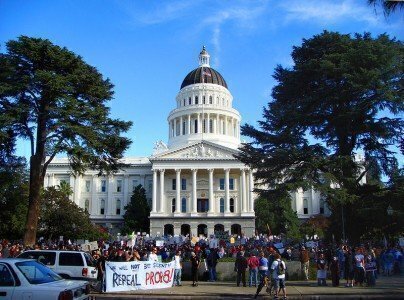In all of the court cases that led up to the Supreme Court’s ruling in favor of same-sex marriage two years ago, only one was a real trial, with dramatic testimony by witnesses on the stand. That was the famous “Proposition 8” trial in California in 2010, testing the constitutionality of a state ban on gay and lesbian marriages.
 But the only Americans who actually saw it were those who could get seats in a crowded San Francisco courtroom. The trial was not televised, as the trial judge wanted and as other notable trials have been – for example, the murder trial of O.J. Simpson. The Supreme Court specifically barred broadcasting of the “Proposition 8” trial. A videotape recording was made of the full “Proposition 8” trial, but it remains locked in a courthouse vault.
But the only Americans who actually saw it were those who could get seats in a crowded San Francisco courtroom. The trial was not televised, as the trial judge wanted and as other notable trials have been – for example, the murder trial of O.J. Simpson. The Supreme Court specifically barred broadcasting of the “Proposition 8” trial. A videotape recording was made of the full “Proposition 8” trial, but it remains locked in a courthouse vault.
On Friday, a San Francisco radio and TV station, KQED, filed a formal request in that same courthouse to allow the release of the trial tape. The broadcaster claims, among other points, that the Constitution’s First Amendment supports public access to that video record. The filing relies partly on a recent decision by the U.S. Court of Appeals for the Ninth Circuit broadening the public right of access to records of civil trials.
“The interests of the public in unsealing the videotapes,” the KQED motion argued, “now far outweigh the privacy or other interests of judicial administration….Any privacy interests of those involved in the trial have disappeared almost entirely, because the trial is no longer ongoing and the appeal has been decided.”
The motion did note that the sponsors of the “Proposition 8” ban on same-sex marriage continue to oppose public release of the videotapes. The proponents have argued since the issue of broadcasting the trial first arose that they fear violent retaliation if the videotapes become public.
In a fictitious sense, many thousands – perhaps millions – of Americans have “seen” the trial. A highly popular reenactment, by Hollywood stars, has been seen across the nation, on TV and on stage, and there have been readings of trial transcripts, even in street theater.
Americans, of course, are great fans of fictional court drama, on TV and in books, but they no doubt realize that is not the same as seeing it “live.” The “Proposition 8” trial of seven years ago still holds a fascination for the public, KQED’s motion said. Just last month, it noted that a “docuseries” on the ABC television network “featured an extended recreation of the Prop 8 trial, with acclaimed actors playing [the trial] judge, the noted attorneys on each side, and even the witnesses.”
KQED’s motion is supported by statements of the now-married gay couple and lesbian couple who had sued to challenge the California ban. They had testified at the trial, and each told the court in their new sworn statements that the written transcripts of the trial do not portray their emotions and reactions as the trial unfolded.
The judge who ran the trial, Vaughn Walker, actually made personal use of the videotapes as he prepared his ruling striking down “Proposition 8.” After the trial was over, the judge retired; in several of his public speeches, he used excerpts of the videotapes, leading to a legal protest by the “Proposition 8” sponsors. That led the Ninth Circuit Court to bar release of the recordings “in the foreseeable future.”
KQED’s motion argued that the changed history of the same-sex marriage movement, with the final victory in the Supreme Court in 2015 upholding a nationwide, constitutional right to such marriages, and the passage of time since the trial supported the plea to release the recordings now.
The marriage-ban proponents will have a chance to reply to KQED’s motion before the U.S.District Court acts on it. Since Judge Walker has retired, the issue will be decided by a different judge.
Legendary journalist Lyle Denniston is Constitution Daily’s Supreme Court correspondent. Denniston has written for us as a contributor since June 2011 and has covered the Supreme Court since 1958. His work also appears on lyldenlawnews.com, where this post first appeared.







